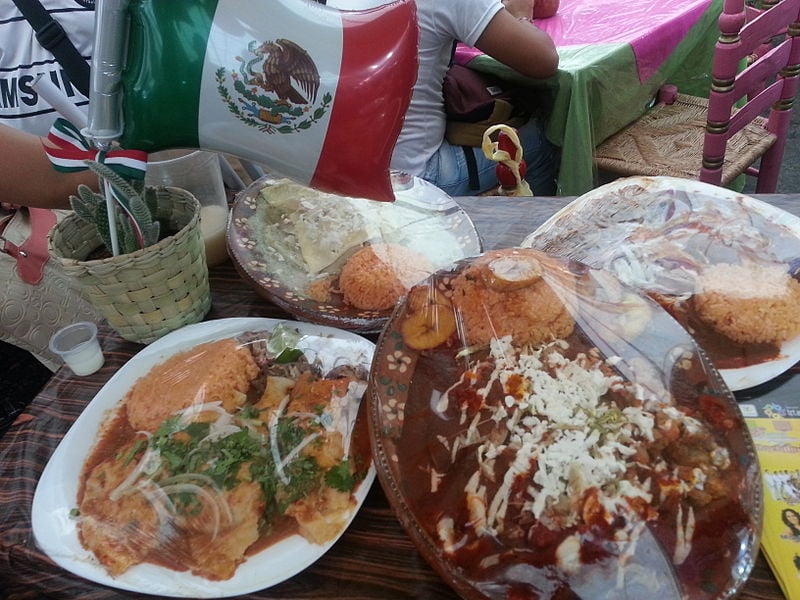David Russell Mosley

Description
Español: Paquete de platillos empaquetados y globo con forma de bandera de México. Mole rojo poblano con pollo Feria Gastronomica de la Enchilada Iztapalapa
Date 30 August 2014, 14:53:12
Source Own work
Author Fer.goiba
(CC BY-SA 4.0)
Ordinary Time
20 September 2016
The Edge of Elfland
Hudson, New Hampshire
Dear Readers,
I’ve been thinking a lot about food lately. Thanks to a paper I’m working on (that is not nearly as close to being done as I’d wish it to be) I’ve been reading and thinking a lot about food. It helps that I love to eat; and that, while I would make no claims of being a gourmand or foodie, I enjoy well cooked food from a variety of regions and areas. Moreover, my favorite foods come from all over the world: I could easily gorge falafel and hummus, really all Persian food; a nice curry is always welcome on summer days; porkpie, both the French-Canadian tourtiere and the British variety are (or were) staples in my diet, especially around Thanksgiving and Christmas; pies in general are among my absolute favorites: sweet and savory; my birthday isn’t complete without either a pork roast with crackling or a poacher’s loaf. I do tend to find that my tastes skew towards the peasant, which is very “in” these days, but that aside, I simply love food.
I am, sadly, not much of a cook myself, though I am working on it. Fortunately, I am married to quite the accomplished cook and have tasted dishes at her hands that have come from all over the world. Part of what I love about food, besides how delicious it is, is how storied food is. Whether within a family or within a culture certain dishes have deep and formative traditions behind them.
For instance, every year, just before Thanksgiving my wife’s Mémère begins making a huge batch of porkpie. Typically, my wife and her sister, and sometimes their mother, go over to Mémère’s house to help. There before them is this enormous pot into which goes the beef and pork and the various spices that are particular to the Marquis family, and possibly the Boucher family as well. Mémère begins adding spices as the other women of the family taste and stir. When I get to be there, I take the patriarchal position of tasting the porkpie to ensure that they are spicing it correctly due to my love for porkpie. When they’re finally done cooking the meat, its put into ready-made pie crusts and each one is baked. Usually, they make a dozen or so and everyone goes home with at least a couple (my family usually gets more). We almost always have one at Thanksgiving, another at Christmas, and eat the others throughout the year. Right now, I believe we still have one or two left in the freezer, ready to be brought out at a moment’s notice.
Food, when we have a right relationship with it, has this communal aspect to it. Families or neighbors gather in kitchens to help cook special meals at special times. This is beautiful. And this brings me to some of the things I’ve been reading lately. Both Norman Wirzba and Angel F. Méndez-Montoya see this communal aspect of food as being related to the Eucharist. Wirzba sees the hospitality inherent in the Eucharist––the fact that it brings together people from all classes, from all walks of life––as indicative of how the rest of our meals ought to function. Being a eucharistic people is to be hospitable, to share our meals, and therefore our lives, with others. Méndez takes it to more interesting heights by highlighting the sophianic nature of the relationship between the Eucharist and the meals we eat. Mendez writes, citing Bulgakov:
“Bulgakov echoes Proverbs 9:1-6, where Sophia shares a banquet, and alludes to her metaphorical identification with meat, bread, and wine. Food points to the root of being as ultimately relational – the very character of Sophia. Sophia is, for Bulgakov, the true expression of the metaphysical, social, and economic life. A similar analogy could be drawn with regard to food. At the metaphysical level, being is the food/substance offered as a gift from God, and thus intimately related to or participatory in the divine.”1
The feast Wisdom is preparing for us is the wedding feast of the Lamb. Sophia is a kind of connection point between the divine nature and creation and so connects us through the food we eat to God via the Eucharist. Méndez still doesn’t make the argument I have and hope to work through in an upcoming talk that the food we eat participates in and is transformed by the Eucharist, but this seems a clear implication of Méndez’s work.
What I love about both Méndez and Wirzba is their commitment to the communal nature of preparing and eating food. It is our duty to share meals, to bring the Other into our midst and to breakdown the barriers that separates “them” from “us”. This is one of the things I love about the Anglican parish understood as the care of souls. For the Anglican priest everyone within their parish belongs to their parish, and therefore to their church, whether they attend the church or not, whether they are Christian or not. It is a real recognition that the Eucharist, despite being inherently exclusive for Christians, is also uniting. It is, as Pieper argues, the heart of divine worship, which is the heart of all celebration.
I highly recommend Méndez’s book The Theology of Food (not that I don’t recommend Wirzba’s book). It is wonderfully written, sumptuous you might even say. Perhaps the most beautiful thing about it, besides his invention of alimentary theology, is the recipe for Mexican mole in the first chapter. Méndez sees theology as being like food and uses molli as a way of explaining the many-layered nature of performing theology. To do this, Méndez relates a story about a time he made mole with and for friends, including the recipe. Ultimately, his point is this: there is, or ought to be, a relationship between food and theology because both are intended to be nourishing, to provide knowledge, to be desired, touched, tasted, to leave us both sated and desiring more. Food, he says, matters. And I agree.
Sincerely,
David
1 Angel F.Mendez-Montoya, The Theology of Food: Eating and the Eucharist (Chichester: Wiley-Blackwell, 2012), 89.
















